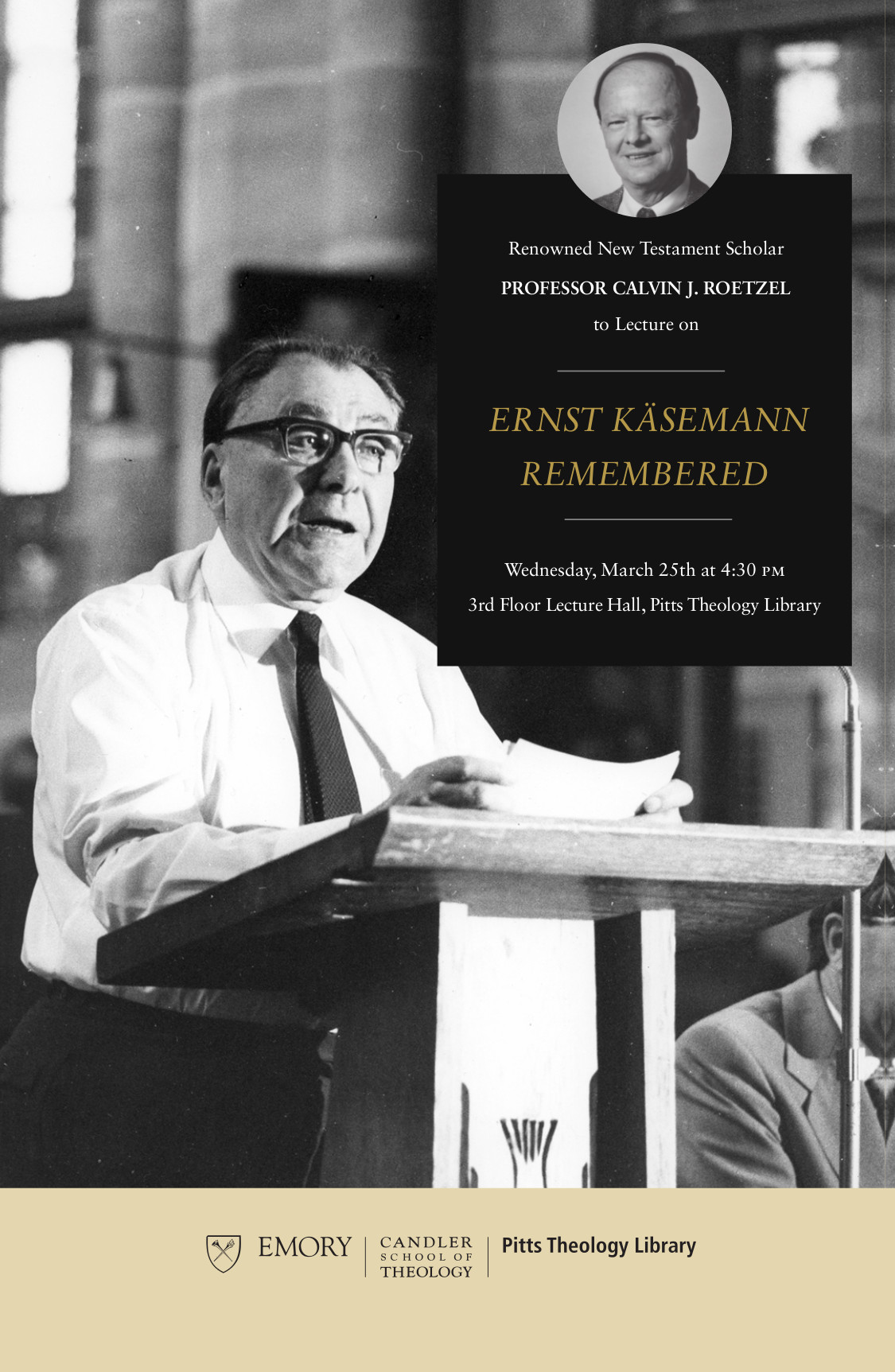Past Lectures at the Pitts Theology Library
Ernst Käsemann Remembered: A Lecture by Prof. Calvin J. Roetzel

On March 25, 2015, The Pitts Theology Library and the Biblical Studies Faculty of the Candler School of Theology welcomed Professor Calvin J. Roetzel, Sundet Professor of New Testament (emeritus), Classical and Near Eastern Studies, University of Minnesota, and Arnold Lowe Professor of Religious Studies (emeritus), Macalester College, to Emory to speak on his friendship with and the influence of Professor Ernst Käsemann, a leading figure in 20th century New Testament scholarship.
Professor Roetzel was one of several prominent American scholars who worked with Professor Käsemann in Tübingen and brought his influence into North American scholarship. Prof. Roetzel has donated to the Pitts Theology Library his personal correspondence with Prof. Käsemann, a collection of letters that ranges in topics from personal details related to his visit in Tübingen to substantive conversations about Pauline theology. The Pitts Theology Library is using Prof. Roetzel’s donation as the beginning of a curation effort of other American scholars who own Käsemann correspondence. Building upon existing archival items, Pitts has contacted several New Testament scholars who have indicated they are interested in participating in this endeavor. Professor Roetzel’s lecture provided the context to this collection and celebrate the enormous contributions of Professor Käsemann.
Hieronymus Wolf in the Pitts Theology Library
On Thursday, February 27, the Pitts Theology Library held an engaging and informative evening focused on a collaborative project by Garth Tissol, Emory Professor of Classics, and Emory senior Ted Parker.
Under Tissol's direction, Parker studied the marginal notes in Pitts Theology Library's 1540s edition of Isocrates’ Orations, once owned by sixteenth-century scholar Hieronymous Wolf. Using this work, Parker and Tissol discovered that Wolf's marginal notes in the Greek volume contributed much to his subsequent editions and translations of the Orations. For this evening lecture, Parker and Tissol spoke about their collaborative project in a lecture entitled "Hieronymus Wolf in Pitts Theology Library: A Sixteenth-Century Editor's Marginal Annotations on Isocrates."
For more information about this project, please see the coverage in a past issue of "Emory Suite 404: An Occasional Journal from the Office of the Provost."
Reformation Women
On Thursday, November 7 for an engaging and informative evening focused on the contributions of women who owned and operated printing presses in the 16th century.
The Evening with Friends event was offered as an extension of Pitts Theology Library's 26th Annual Reformation Day. The theme this year was Reformation Women and full day of events took place on October 24.
For our evening lecture, on November 7, our speaker Armin Siedlecki, Ph.D., Head of Cataloging at Pitts Theology Library, gave a talk entitled, "A Forgotten Page: Women and the 16th Century Printing Industry." In addition, a variety of materials from the Kessler Reformation Collection were on exhibit, including writings by and about women during the Reformation.
Sermon Collections
Thursday, April 4, we hosted an engaging and informative evening focused on highlights of the sermon collections of Pitts Theology Library.
Robert Silliman, Ph.D., Emory University Professor of History Emeritus, spoke about his experience transcribing the sermons of James Archer, a Catholic priest living in England in the late 18th and early 19th centuries whose sermon topics include religious persecution, spirituality, and marriage. Prof. Sillliman's talk was entitled, "Spiritual Instruction for Priests and Nuns from a London Pub in the Sermons of James Archer, circa 1800."
Ted Smith, Ph.D., Assistant Professor of Preaching and Ethics at the Candler School of Theology, gave a lecture entitled, "" 'To Almost Every Protestant Library': The Sermons of James Archer, Catholic Preacher in Georgian England", discussing Archer's more assimilated style of preaching that Protestants admired but could not quite accept and that English Catholics, too, came to reject.
American Hymnody
Thursday, March 7 was an entertaining and enlightening evening reflecting on the ways some of the most important European composers have found a place in American hymnody.
“American Music Goes 'Scientific': 19th-Century US Hymnody's Classical Borrowings" by Peter Mercer-Taylor, Ph.D.
Peter Mercer-Taylor is an Associate Professor of Musicology the Director of Graduate Studies of the School of Music at the University of Minnesota. He earned his B.A. (1988) from Amherst College and his M.A. and Ph.D. (1995) from the University of California, Berkeley. He previously taught humanities and popular culture in the interdisciplinary honors college of Valparaiso University, joining the University of Minnesota faculty in 2001. Prof. Mercer-Taylor's scholarship has been divided between the19th-century German classical tradition—Felix Mendelssohn in particular—and contemporary popular music, including the work of the Bangles, Elvis Costello, Bill Staines, and R.E.M. He is currently at work on a book on the impact of European classical music on 19th-century American hymnody.
Incunables: Books printed before 1501
On February 21, 2013 the evening focused on the history of printing as seen through Pitts Theology Library's collection of incunables, or incunabula (books printed before 1501).
One Hundred Incunabula: The Early History of Printing from Pitts Theology Library's Collection by David Parsons
David Parsons was born and raised in England, educated at Oxford, and spent most of his business career as an actuary in Atlanta. David is a collector 15th and 16th century accounts of exploration and travel. He is on the Boards of the Folger Shakespeare Library and the John Carter Brown Library, on the Advisory Committee for the Kessler Reformation Collection, and a member of The Grolier Club.
